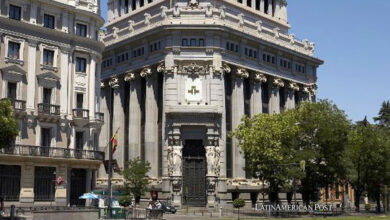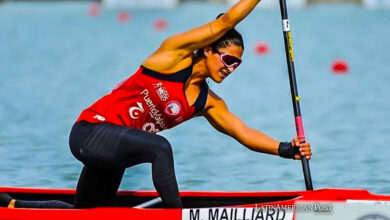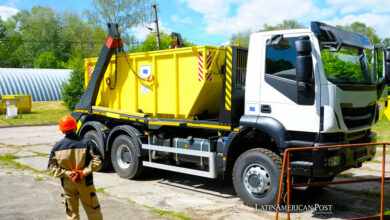Coverage: This is how the Colombian State fails when protecting social leaders
LatinAmerican Post's team identified State's failures when social leaders need protection

El Colombiano informs that 90 social leaders have been assassinated so far in 2018; El Tiempo says there have been more than 123 murders; El Espectador reports, being more accurate, that in a month 24 leaders died.
Leer en español: Reportaje: 3 fallas del Estado colombiano en la protección de líderes sociales
These murders happening during Juan Manuel Santos' government. In total, during the eight years that his administration lasted, in spite of the peace process, 532 leaders died, according to the Information System on Attacks against Human Rights Defenders (SIADDHH). The figure, beyond the outrage, rejection and sadness it causes, leads to several questions:
- What kind of failures has the Colombian State had in the protection of social leaders?
- Are the leaders alone?
- What should the State do to protect them?
1. Irregularities in the National Protection Unit (UNP)

One of the measures adopted by the State to protect social leaders in Colombia is to equip them with bulletproof vests, armed escorts, and armored cars. This service is offered exclusively by the National Protection Unit (UNP, in Spanish), created in 2011. However, for the organization Somos Defensores "the astronomical budgets invested in the issue and the growing demand for this type of protection" lead to reevaluation if it's a good option.
Furthermore, "from the exercise of civil protection carried out by Colombian social and human rights organizations it has been shown that it should not be the only alternative to protect social leaders", affirms Somos Defensores.
Additionally, in response to a request for the number of officials hired to carry out the protection of people at risk, made by the aforementioned NGO, the UNP responded that "it has 739 employees distributed throughout the country."
"Likewise, the UNP reported that it has regional work centers in the cities of Barranquilla, Cartagena, Cúcuta, Bucaramanga, Cali, Pereira, Ibagué, Neiva, Medellín, Popayán, and Pasto. However, and from the information provided by the UNP, it is striking how in cities such as Cartagena, Popayán and Pasto, public officials with responsibilities in the area of protection, claimed not to have knowledge of the existence of UNP officials in their department. or city ", highlights Somos Defensores.
"The biggest concern in the matter of responding effectively to the demand for state protection is that with 739 officials it is almost impossible to be effective in such an important task," says the NGO in its report Al Tablero .
It is worth adding that to some social leaders, the UNP has withdrawn their protection. A recent case, as reported by El Heraldo, is that of Yelenca Gutiérrez Fajardo, indigenous leader of the Wayu Nation movement, who through a letter addressed to Diego Fernando Mora, director of the National Protection Unit, denounced that on 21 September 2018, her protective measures were dismantled.
Also read: Colombia is still the world's biggest producer of cocaine
"I want to make it public and in writing that I am in a vulnerable situation and now even more because my family has been victim of kidnapping by common criminal groups," the document says. Apart from the threats, she has received because of her management as a human rights leader, her husband was abducted for 7 days in Tomarrazón, rural area of Riohacha.
"Anything that happens to me or a member of my family, I blame the State or the UNP for not guaranteeing the right to life, liberty, and security of my family," said Yelenca.
On the other hand, the organization Equipo Nizkor revealed that in an operation carried out in several cities in Colombia by the Unified Action Groups for Personal Liberty (GAULA, in Spanish), they captured nine policemen who were part of the gang of kidnappers "Los Magníficos", which operated in Antioquia.
Among the detainees, there was "Jefferson de Jesus Sangregorio Esquea, alias "Mi Sangre", escort of the Integral Security Temporal Union 2016, contractor company of the UNP, in charge of the schemes of thousands of citizens threatened in the country. The indigenous leader Juvenal Arrieta González, was escorted by "Mi Sangre". This fact set off alarms both in the UNP and in those to whom it provides its service, the NGO highlights.
2. Not recognizing systematics in murders

NGOs such as Peace and Reconciliation have asked the State to recognize the systematic nature of the assassinations of social leaders, since when implementing protection mechanisms they will be ineffective.
"The cases that are occurring with the victimization against the social leaders, have a systematic component that, although it does not fulfill from a legal perspective the composition between the profile of the victims and the victimizers, there is a recurrence, at least in the last three years, in the profiles of the victims", says in an interview for LatinAmerican Post Carlos Montoya, sociologist and political scientist of the Pontificia Universidad Javeriana, in charge of the Conflict, Peace and Postconflict area in the Peace and Reconciliation Foundation.
Also read: This is how the Venezuelan government censors digital media
The task of the State must be to "identify in the territories as in the victims those characteristics that indicate which activities pose the greatest risk to a social leader," explains Montoya. "For example, in the Urabá Antioqueño, any land restitution leader has a death sentence for his political activity and defense of the land and restitution of land," he said.
Omar Díaz, a human rights lawyer, says in conversation for LatinAmerican Post that on social leaders' murders "there is systematicity in the type of murder, modus operandi, that is, in the way of killing, the previous intelligence, the hours in which people leave their residences. That is to say: there is a tactical intelligence that allows to identify your routines". In addition, it warns that the way in which the crimes against leaders have occurred is similar to what the paramilitaries did when they "fought against the insurgency".
For his part, senator of the Alternative Democratic Pole, Alexander Lopez, told LatinAmerican Post that "in many cases murder, exile and threats come from the same State. You will find mayors and governors who do not like the way a community leader acts. We have found cases where mayors and governors have been condemned for the persecution and murder of leaders. Then, the regrettable thing is that from the same State the social leaders are being persecuted ".
Another profile that exists, Montoya emphasizes, and that the State must pay close attention to its protection, are "the leaders who have been working in Nariño, those who have been denouncing illicit crops. They have different profiles to those who work in other territories".
However, on the way to the recognition of the profiles of each social leader, Montoya says that the National Police with its Elite Group "has recognized that there are several leaderships in the territory and that these have recurrent effects according to their activities". The Procurator General of the Nation has done the same.
Carlos Montoya emphasizes that a great advance of the State in the way of the protection of social leaders will be to recognize that not only with identification and judicialization of those who commit the murders can social leaders be protected but that they must stop something more important: find the economic, political and armed groups that order the murders. By doing so, a great step can be taken in terms of protection and justice for all types of leaders in Colombia.
3. Stigmatization of social leaders

At the end of 2017, the former defense minister, Luis Carlos Villegas, in his statements to the media about the murder of social leaders in Colombia, said they were due to "land disputes and skirmish." The fact was considered, by various social organizations and victims, as an act of discrimination, stigmatization, and revictimization of social leaders in the country.
It happened again. This time, declarations came from defense minister, Guillermo Botero, who publicly expressed that social protest-a resource that social leaders in Colombia have used for years, among other populations, to claim their rights- "was financed by the armed groups such as the FARC, the ELN, the 'Gulf clan', and the 'Pelusos' dissidents". As a result, he was summoned to political control by the senators Iván Cepeda and Feliciano Valencia and received the rejection of social organizations and victims.
The representative to the chamber and former candidate for the vice presidency of Colombia, Ángela María Robledo, says for LatinAmerican Post that "it is an irresponsible declaration, almost a death threat for social leaders".
"What policy is worth?" Robledo asks in relation to the protection of social leaders "when there is a defense minister who revictimizes them and generates a condition of vulnerability for their struggles, because here are the defenders of water, women, of peace, of the voluntary eradication of illicit crops. It is delegitimizing those struggles and at the same time putting them at risk".
The work of Attorney General of the Nation
One of the entities of the State, in charge of investigating who are responsible for the crimes against social and judicialized leaders, is the Prosecutor's Office. However, "at this moment the Prosecutor's Office does not have the technical or human capacity to investigate the threats," says Carlos Guevara Botero, of Somos Defensores NGO to a Pacifista media.
"The number of homicides that the Prosecutor's Office must attend at times is 10 times greater than the number of threats," argues the same media. Therefore, the UNP ends up being the only one in charge of the protection of social leaders throughout the country.
Security of social leaders after the peace process

Although the peace process between the Farc and the government of former President Juan Manuel Santos, contributed to diminish, in some areas, the widespread violence in Colombia and "took away the argument that because of FARC there was not social processes", says Montoya, the realities that some leaders live today, in the absence of the FARC, and the arrival of new armed groups, is complex.
"In recent times with the departure of the FARC from the territory, the State failed covering the territories that the FARC left behind and the paramilitaries have returned, which is in a process of reorganization, of reactivation. In Arauca, being a border, it allows them to enter from Apure state (Venezuela) and from Cúcuta. This has generated the persecution of social leaders and the murder of human rights defenders, the presidents of the community action councils, as well as the members of the Farc political party", he says in a conversation with LatinAmerican Post, Maria Ruth Rueda, 56, social leader defending human rights in the Permanent Committee for the Defense of Human Rights of Arauca, Arauca.
Also read: Colombians deported from Venezuela: This is their double tragedy
"It is a territory where the internal armed conflict was very strong. There was the presence of the tenth front and 45 front of the Farc. There was also a large presence of the ELN. Today, we see the resurgence of paramilitary groups", says Ruth.
"Antioquia, Cauca, Valle del Cauca, Nariño, and Norte de Santander are the states with the most violence against social leaders, in addition to Chocó and Cesar regions," says a report from the Institute for the Development of Peace (Indepaz). from the beginning of 2018.
Map of the places where crimes against social leaders in Colombia are committed the most
Map from @elespectador and @Indepaz shows social leaders murdered in "post-conflict" #Colombia _just so far in 2018_.https://t.co/VTpIgIk92k
Remember when we all said "the post-conflict will be more violent than the last years of the conflict?" Not at first—but here it comes. pic.twitter.com/TmvNLIrCqO
— Adam Isacson (@adam_wola) 2 de febrero de 2018
In this context, the rearmament of FARC dissidence, which began in mid-2016, is added, when the first front of the FARC decides to depart from the peace process, according to the Ideas for Peace Foundation, due to economic, political, and social factors.
According to the aforementioned organization there would be more than 1000 dissidents. The Attorney General of the Nation, in information collected by the FIP, reports that there are 16 groups distributed in 48 municipalities of the country. Between the Dissidences confirmed by the government and the Public Force to the FIP, it was known that the FARC's dissidence is concentrated in departments such as Cauca and Nariño, distributed as follows:
Nariño
- People of the Order, today Guerillas United of the Pacific (GUP): Those of "David".
- United Guerrillas of the South or Oliver Sinisterra Front: Those of Guacho and former militiamen of the Column Daniel Aldana.
- Groups composed of ex-combatants from Front 29: Resistencia Campesina and Las Vacas or Los de Vaca, Los de Sábalo, Los de Morocho and Los Cucarachos (subdivided IGNORE INTO bands called Los Lobos).
- Urban helmet of Tumaco
- Neighborhood controls that went through the Daniel Aldana and before were from Los Rastrojos. Their confrontation has caused the recent displacement of about 1,500 people.
- Those of "Tiger".
- There is also presence of the GUP and recently there has been an incursion of 'Los de Guacho'.
Cauca
- Fronts 6 (north), 30 (north-pacific), Jacobo Arenas mobile column and Miller Perdomo mobile column (north-center). More than dissent, they are militia networks that never enlisted and would be forming new groups in alliance with other criminal agents and guerrilla groups.
What does the Government of Iván Duque propose for the protection of social leaders?
In the political control debate convened by Ángela María Robledo on the protection of social leaders, the Minister of the Interior, Nancy Patricia Gutiérrez, said that a "restructuring of the National Protection Unit (UNP) program must be carried out; guarantee the functioning of the Security Guarantees Commission; create a technological platform with the use of artificial intelligence that allows a real and effective tool for citizens to be aware of the management of the State; and finally, work on a road map with the Attorney General's Office to issue a comprehensive public policy that defends social leaders", Kienyke informed.
Later, as reported by El Colombiano, President Ivan Duque proposed from Apartadó, Antioquia, during the meeting with some social leaders, that he will launch a policy to defend social leaders that consists of improving early warnings, protection mechanisms, prevention models of risk situations, and sanctions to those responsible for murders.
However, the senator of the Alternative Democratic Pole, Alexander Lopez, states that what must be done, as a first step, so that there is a good State policy against the protection of social leaders is to remove "government officials who hate the social leaders. For example, the Minister of Defense. " "One can not consider that there is a Duke policy for the protection of social leaders when the Minister of Defense says that his protests are financed by terrorist groups. It is generating direct violence", he says.
Experiences and proposals of some social leaders
María Ruth Rueda, a survivor of the Patriotic Union and social leader in the defense of Human Rights in Arauca, was victim, for her work, of an attack against her life on May 22nd at 8:00 p.m. while traveling from Tame to Arauquita. Individuals who were mobilized in a red double cab, opened fire on the vehicle where they were traveling, describes the complaint made by the Permanent Committee, the organization to which she belongs.
In an interview for this medium, Rueda relates that she "suffered an attack with more than 30 shots and a pursuit of more than one kilometer. We ended up with the car punctured. I was taken to Bogotá, a relocation aid of three months. But my protection was not increased. I have a 3 armor car, and did not upgrade it. I was not given another man of protection. I do not have a protective vest of my own. There is nothing that guarantees protection for us and my family that is threatened. Here, in Bogotá, they have followed me up, when they have been looking for me, posing as my children", says Ruth.
"The only alternative they show us is leaving the country. They take us out of the territory. It's like when you take the fish out of the fish tank. What they want is to end us. In my case, that is the only thing I know how to do: to defend life, they have me locked up, we are filled with stress, we get sick. They bring us to a city that is not our territory. We close the spaces. They condemn us to political death".
"Human rights defenders are not very well seen. Social organizations have suffered imprisonment and assassinations, as in the case of our Permanent Committee prosecutor, José Gregorio Izquierdo, where they have arrested the entire board of directors, where they made an attack on me and there is still no clarity in the facts. For me, it was the paramilitaries, for the complaints I had been making", says María Ruth Sanabria.
As a result of her situation of insecurity, María proposes to the government of Iván Duque "that he should talk with the human rights defenders, with the opposition parties, with the alternatives of different thought in the country, with those who want to build a country full of peace, tranquility, to build a real public policy that allows us to guarantee the exercise of our work to the defenders of human rights and our lives, that of our children. Only this way can one be speaking of a social State of right, because, in spite of being consigned in the Constitution, Colombia is not a social state of right ".
Another case is that of Lino Murillo, social leader of the Santa Rita neighborhood in Bogotá. He suffered, the harassment of a man who approached him at 11 o'clock at night asking him if he was Lino Murillo, while he was coming to the Santa Rita neighborhood, after crossing the bridge that connects with the Centro Mayor shopping center.
"I was affraid, but I tried not to show it, to avoid detection. The guy who asked for me, I did not know him. One as a social leader, usually, almost always knows the people of the sector. It was someone they sent. Fortunately, he did not know me", Murillo says.
Regarding his proposal to improve the protection of social leaders in the city, Lino points out that one must work collectively and not leave the responsibilities to only one person. He asks that in schools there be large campaigns in support of security, where the police work together with students. Also, he proposes distribute flyers to merchants and inhabitants of the area to improve the security not only of his sector but that of the city in general.
LatinAmerican Post I Edwin Guerrero Nova
Translated from "Reportaje: 3 fallas del Estado colombiano en la protección de líderes sociales"
Listen this article





